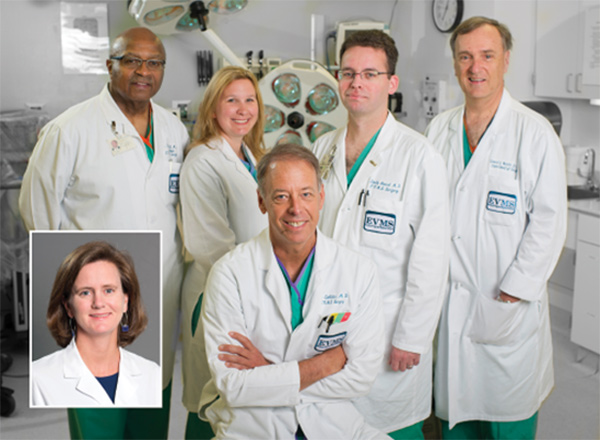… providing 24/7, 365 emergency surgical and critical care

Acute Care Surgery is an evolving specialty that arose following a 2005 survey conducted by the American College of Surgeons. The survey demonstrated that trauma and critical care surgeons were increasingly responsible for emergency surgical care; in fact, nearly 75 percent of emergency departments identified inadequate on-call specialty coverage. A 2006 Institute of Medicine report on the future of emergency care confirmed the national shortage of on-call specialists.
In 2007, recognizing the growing and disturbing trend, Eastern Virginia Medical School established the Acute Care Surgery service at Sentara Norfolk General Hospital. Today, Acute Care Surgery (ACS) consists of five full-time EVMS surgeons, all Board certified and fellowship trained in trauma, emergency general surgery and critical care medicine.
Trauma accounts for only a portion of the work these surgeons do. Jay N. Collins, MD, a member of the ACS team, explains: “We are available every day of the year, and every hour of the day, for any kind of surgical emergency people might have. Whether for common diseases like appendicitis, diverticulitis or gallstone problems, or more complex cases involving perforations and serious infections of the abdomen, bowel obstructions of both the small and large intestines, and cancers that perforate into the abdomen, the team is immediately available.”
These conditions are unrelated to trauma, but each is serious and each can be potentially life threatening in its own right. Each represents no less dramatic a medical catastrophe, requiring no less a skilled, expert specialist.
In a typical scenario, a patient might experience abdominal pain and sit around the house, resting, hoping it will pass. But when symptoms don’t resolve, these patients arrive at the emergency room with fever, weakness, dizziness, hyperventilation and, by that time, often in need of urgent medical care. “When they come to Sentara Norfolk General,” Dr. Collins says, “they undergo an exam and are given blood tests, x-rays, CT scans if needed, and we are immediately contacted by the ER physicians. Any time of the day or night, one of us is on site, ready to examine and evaluate these patients, and if necessary, take them to the operating room without delay to correct their problems.”
Fortunately, not everyone who is seen by ACS requires surgery immediately. It’s as important to know when to operate as it is to know when not to, Dr. Collins emphasizes. In some instances, with very complicated cases, e.g., a patient with a cardiac or lung diseases who presents with appendicitis, the surgeons may choose to administer antibiotics initially and then monitor the patient carefully. ACS surgeons may consult with the patient’s specialist(s), but if during the course of treatment the patient worsens, it is the ACS surgeons, who have been continuously watching the patient, who make the determination that the time has come for surgery.
When they do need surgery, one of the benefits for patients of Acute Care Surgery is that they remain under the direct care of these five surgeons throughout their entire hospitalization. Some of these patients may be very ill post-operatively, requiring mechanical ventilation, medications to maintain blood pressure if in septic shock, and careful monitoring. They are admitted to the ICU by their ACS surgeon, and treated by the ACS team until discharge.
In addition to caring for the patients who go directly to Sentara Norfolk General’s emergency room, the EVMS Acute Care Surgery service has established relationships with several freestanding emergency rooms throughout Hampton Roads and on the Eastern Shore. The smaller community hospitals in the area often refer their patients with complicated medical problems – such as smokers with COPD, a history of multiple heart attacks, pulmonary emboli or transplants – to ACS as well, recognizing the experience of surgeons who work in a tertiary care hospital.
That experience is vast and comprehensive: with referrals from virtually every physician, hospital system and private practice in the community, the surgeons of Acute Care Surgery at EVMS evaluate as many as 1,200 patients every year.
EVMS Brickhouse Professor and Chair of Surgery LD Britt, MD, MPH, author of the name “Acute Care Surgery”, served as Editor-in-Chief for the first textbook on the subject, Acute Care Surgery Principles and Practice, and later was the senior editor for the second textbook, Acute Care Surgery. The follow-up edition is currently in progress.

